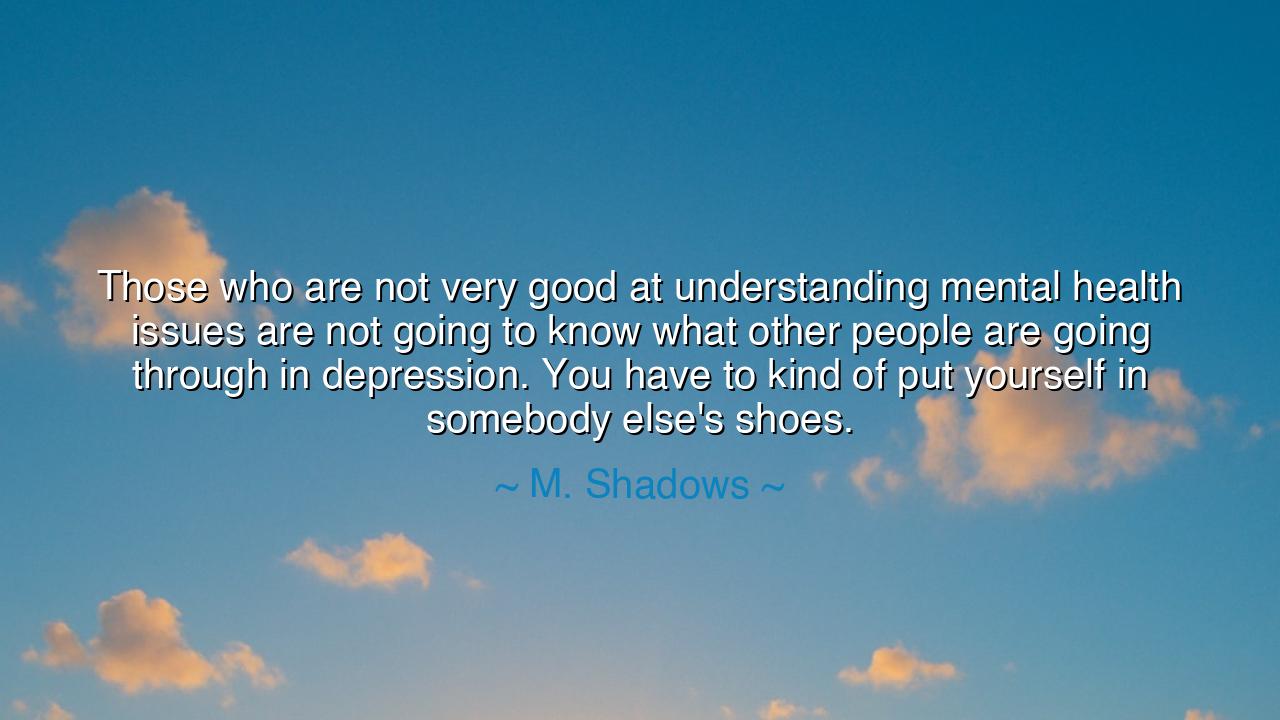
Those who are not very good at understanding mental health issues
Those who are not very good at understanding mental health issues are not going to know what other people are going through in depression. You have to kind of put yourself in somebody else's shoes.






“Those who are not very good at understanding mental health issues are not going to know what other people are going through in depression. You have to kind of put yourself in somebody else's shoes.” — thus spoke M. Shadows, the voice of both thunder and tenderness, a man who has walked through the storms of sound and the silences of the soul. His words ring with the gravity of one who has seen suffering not from afar, but up close — a reflection on empathy, awareness, and the sacred duty of compassion. In an age where the mind is often unseen and pain hides behind smiles, his message becomes not a simple observation, but a call to understanding, as ancient as humanity itself.
For what he speaks of is the blindness that often afflicts those who have never walked through the shadowed valleys of the mind. The one who has never known depression may think it merely sadness, or weakness, or a failure of will — when in truth, it is a deep storm that can drown even the strongest. M. Shadows reminds us that to truly help another, one must not look upon their pain from a distance, but must dare to step inside it, to imagine what their days feel like, to hear the silence that fills their nights. This is what it means to put oneself in another’s shoes — to lend not advice, but presence; not judgment, but understanding.
The ancients taught this wisdom in other forms. The philosopher Seneca, who counseled emperors and suffered exile, wrote that no man is truly wise until he learns to suffer with others — that sympathy is the bond that unites all souls. And the Buddha, long before him, spoke of compassion as the highest form of enlightenment — to feel another’s sorrow as one’s own. What M. Shadows has said in modern words echoes these eternal truths: that the greatest strength is not in power or intellect, but in the heart’s ability to feel beyond itself.
There is a story, too, from the life of Abraham Lincoln, who battled the “melancholy” that haunted him throughout his years. Though many mocked his solemnity, it was this deep empathy born of suffering that made him one of history’s most compassionate leaders. When others urged him to punish his enemies with vengeance, he instead spoke of mercy, saying, “I destroy my enemies when I make them my friends.” His own struggle with inner darkness gave him sight into the pain of others — the same sight that M. Shadows calls us to awaken in ourselves. For understanding mental health begins not in study, but in humility — in recognizing that the mind’s depths are vast, mysterious, and sacred.
In a world that moves swiftly and judges quickly, the ability to pause and empathize becomes an act of quiet rebellion. The person who listens — truly listens — to another’s pain becomes a healer, even without words. To “put yourself in somebody else’s shoes” is not a metaphor to be recited lightly; it is a practice of the soul, a discipline of patience and tenderness. It demands that we silence our pride, set aside our comfort, and enter another’s world — even if only for a moment. For in doing so, we affirm their humanity, and in turn, rediscover our own.
The lesson, then, is one of both heart and action. When you see someone withdrawn, do not rush to fix them — listen. When another’s struggle confuses you, do not dismiss it — seek to understand. Read, learn, and reflect on the nature of the mind, not only for your sake, but for the sake of those who may one day need your gentleness. Let your speech be slower, your eyes softer, your hands more patient. For every person you meet is fighting a battle you cannot see, and your smallest act of empathy may be the light that saves them from despair.
So, my children of the modern age, remember this truth: to understand is to heal, and to empathize is to become fully human. When you cannot comprehend another’s suffering, walk with them anyway. Ask not, “Why can’t they be stronger?” but rather, “How can I stand beside them?” For compassion is the bridge that connects one soul to another, and across that bridge flows the lifeblood of all hope. And when you live this way — when you learn to walk in another’s shoes — you will not only ease their pain, but awaken within yourself the oldest and noblest virtue: the boundless strength of the compassionate heart.






AAdministratorAdministrator
Welcome, honored guests. Please leave a comment, we will respond soon